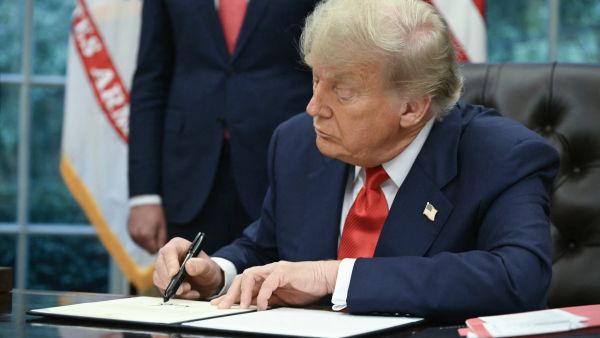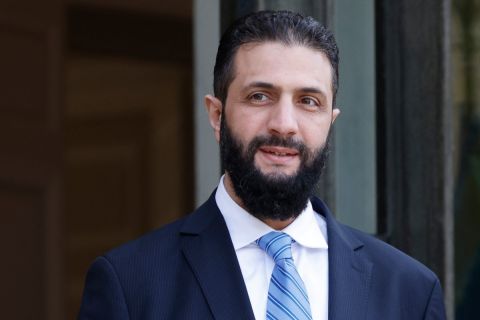ALBAWABA- The United States has officially lifted the majority of its economic sanctions on Syria, marking a historic pivot in Washington’s Middle East policy.
The decision, announced in a statement from the White House, follows an executive order signed by President Donald Trump and is aimed at giving Syria “an opportunity to rebuild” after more than 14 years of civil war.
The move is widely seen as a vote of confidence in Syria’s new leader, Ahmad al-Sharaa, whose revolution ousted Bashar al-Assad last year, ending five decades of Assad family rule.
Trump, who first hinted at the sanctions relief during his May visit to Riyadh, met with al-Sharaa shortly after and praised him as a “tough man” and a “fighter with a strong past.”
According to U.S. officials, the executive order will end most financial restrictions, while retaining sanctions on Assad, now in exile in Russia, along with his key associates, individuals involved in human rights violations, chemical weapons programs, and Iran-backed militias.
The order also directs the Secretary of State to review Syria’s designation as a state sponsor of terrorism, as well as the status of Hay’at Tahrir al-Sham (HTS), the dominant group in Syria’s new government, which the U.S. previously listed as a terrorist organization.
Brad Smith, Acting Under Secretary for Terrorism and Financial Intelligence, said the decision paves the way for renewed international investment and reintegration of Syria into the global financial system. “The actions taken today will end the country’s isolation, encourage trade, and support regional stability,” he stated.
While HTS and al-Sharaa’s government emerged from factions with past ties to al-Qaeda, al-Sharaa renounced those affiliations in 2016 and pledged to build an inclusive government representing all sects and communities. Despite ongoing divisions within Syria, U.S. officials say the new leadership has shown signs of moderation and willingness to align with Western interests.
The White House also confirmed that the administration is exploring normalization of relations between Syria and Israel as part of a broader regional strategy. Officials expressed hope that Syria could eventually join the Abraham Accords, following the model of the United Arab Emirates and other Arab states that established ties with Israel in 2020.
Israel, which launched a series of military operations in Syria following Assad’s fall, has indicated a potential shift. On Monday, Israeli Foreign Minister Gideon Sa’ar said his country is open to formal relations with Damascus.
The Syrian Foreign Ministry welcomed the executive order, describing it as “a critical turning point” that removes a major barrier to national recovery. Officials in Damascus say the lifting of sanctions will help restore vital infrastructure, attract foreign investment, and lay the groundwork for the safe return of millions of displaced Syrians.
The move comes after Washington issued a 180-day exemption from the Caesar Syria Civilian Protection Act last year, and a general license authorizing limited transactions with al-Sharaa’s government, steps seen at the time as a prelude to broader normalization.
Despite optimism, U.S. authorities stressed they will continue to monitor Syria’s political developments closely. The Treasury Department confirmed that sanctions will remain in place against actors deemed a threat to U.S. interests, including ISIS affiliates, pro-Iran militias, and extremist Palestinian groups.










![Turkish series "Ask-ı Memnu" [Forbidden Love]. Turkish series "Ask-ı Memnu" [Forbidden Love].](/sites/default/files/styles/d02_traditional/public/2026-02/%D8%A3%D8%A8%D8%B7%D8%A7%D9%84-%D9%85%D8%B3%D9%84%D8%B3%D9%84-%D8%A7%D9%84%D8%B9%D8%B4%D9%82-%D8%A7%D9%84%D9%85%D9%85%D9%86%D9%88%D8%B9.jpg?h=c673cd1c&itok=nhq8-5rH)
